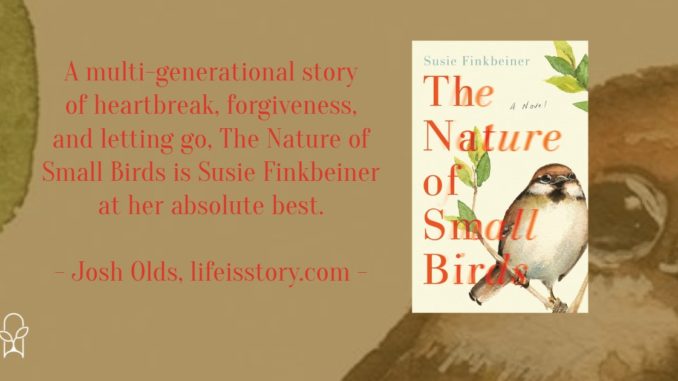
Also by this author: Stories That Bind Us, The Nature of Small Birds, The All-American
Published by Revell on July 6, 2021
Genres: Fiction, Christian, General, Historical
Buy on Amazon
Goodreads

In 1975, three thousand children were airlifted out of Saigon to be adopted into Western homes. When Mindy, one of those children, announces her plans to return to Vietnam to find her birth mother, her loving adoptive family is suddenly thrown back to the events surrounding her unconventional arrival into their lives.
Though her father supports Mindy's desire to meet her family of origin, he struggles privately with an unsettling fear that he'll lose the daughter he's poured his heart into. Mindy's mother undergoes the emotional roller coaster inherent in the adoption of a child from a war-torn country, discovering the joy hidden amid the difficulties. And Mindy's sister helps her sort through relics that whisper of the effect the trauma of war has had on their family--but also speak of the beauty of overcoming.
Told through three strong voices in three compelling timelines, The Nature of Small Birds is a hopeful story that explores the meaning of family far beyond genetic code.
Turns out that the nature of small birds is to fly. It’s no different for our kids. And, whether I’m aware of it or not, it’s the nature of God to see every dip and dive and lift, to glory at the triumphs and grieve when they fall.
I went into The Nature of Small Birds knowing nothing about the novel, other than that it came from the heart of Susie Finkbeiner and that’s enough. I was introduced to Susie through her 2020 novel, Stories that Bind Us, and fell in love with her storytelling style, her well-written characters, and the way in which her stories simply portrayed their lives as stories. Nothing sensational. Nothing stretched to an extreme. Real life is dramatic enough. And so it is here.
The story is about Bruce, or maybe Linda, or Sonny, or it’s really about Minh. The lack of a clear protagonist is usually a mark against a novel, but in The Nature of Small Birds it simply highlights that the entire family and their relationship throughout the ages is to be the focus. Their stories are interrelated, none more important than the other. Trauma and pain, joy and healing all look differently and are dealt with differently in different people. A multi-generational story of heartbreak, forgiveness, and letting go, The Nature of Small Birds is Susie Finkbeiner at her absolute best.
The novel is told in three interlacing perspectives that show the Matthews family at various points along their journey. Through Linda’s eyes, we glimpse the story from the vantage point of a young woman in the 1970s, recently married and dealing with integrating into the Matthews family. As time moves on, this storyline becomes the adoption storyline, as Linda and Bruce choose to adopt a young girl from Vietnam. Finkbeiner’s portrayal of the 1970s is gripping and—at least to me, who only knows of the 70s from history books and my parents—an apt portrayal. The specter of the Vietnam War hangs over everything, setting the tone for many of the relationships in this time period.
The second storyline comes from a teenage Sonny, the oldest daughter of Linda and Bruce, and younger sister to Minh, or Mindy. At first, her story seems to be a bit more separated from the other two perspectives—a bit more lighthearted, a bit of a different focus, a more traditional coming-of-age tale, full of 1980s cultural easter eggs. But it too soon becomes saturated with the themes of growing up, moving into a new phase of life, and understanding your relationships with those around you.
The third storyline comes from Bruce in 2013. This is a markedly different storyline than the others. The first two are female perspectives in their twenties and teens. Bruce is a man in his sixties, dealing with elderly parents, adult children, and his own mortality. And because of the other storylines, we have perspective on his past and what has led to this stage of his life.
Embedded through these storylines in the story of Minh. The Matthews family adopts her at the end of the Vietnam War as a part of Operation Babylift, a desperate attempt to evacuate children from South Vietnam before the fall of Saigon. The Matthews family must deal with the complexities of interracial adoption, the racism and ignorance of family and friends, the traumatic background of their daughter, and the sudden integration of a new person into their family. As Minh grows up, it becomes a story of comparison and fitting in among the predominantly white culture she’s placed in. It all culminates in the last storyline when, as an adult, she begins seeking out information about her birth family and culture.
Each of these storylines could be entire novels in themselves and, if I had one criticism to make, it would be that I loved each of these storylines so much I wish they had been. I wanted more time, more depth, more nuance. But as is, Finkbeiner handles each element superbly, neither ignoring or perseverating on any one theme but drawing out each thread in equal measure to carefully weave them together in well-balanced symmetry.
The Nature of Small Birds could have been so many things: a novel of adoption, a novel of child loss, a coming-of-age novel, a novel about transitioning to an empty nest, a novel of war, a novel of discovering one’s heritage and identity, and more. Instead, it’s all those and much more, teaching us that life isn’t just a story. Life is stories, plural. It’s all these things going on at once, flitting from here to there, facing triumph and grief, sometimes concurrently. And it’s the nature of God to see every dip and dive and lift, to glory at our triumphs and grieve when we fall.
